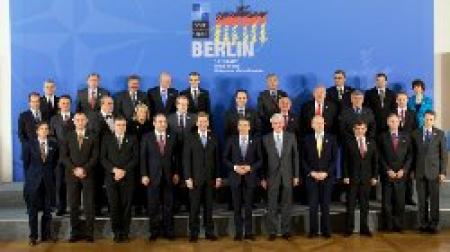ID :
175761
Sat, 04/16/2011 - 11:21
Auther :
Shortlink :
https://www.oananews.org//node/175761
The shortlink copeid
NATO meeting in Berlin agrees to disagree on future Libya policy

Berlin, April 16, IRNA -- Foreign ministers from 28 NATO countries meeting in Berlin over the past two days failed to agree on a clear strategy on ending the deteriorating Libyan conflict.
Major differences between NATO powers like the US, France and Britain who have been pushing for stepped up air attacks and other NATO allies, notably Germany, Spain and Turkey who have been pressing for greater political efforts to resolve the Libyan crisis remained.
Although NATO delegates tried to propagate that the western military pact was following a clear and unified policy on Libya, more and more disagreements leaked out of the closed-door meetings in the German foreign ministry, especially on the issue of further military actions in Libya.
NATO Secretary General Anders Fogh Rasmussen tried to unify the quarreling member states by openly calling for the removal of Libyan dictator Moammar Qadhafi from power.
By doing so, he has indirectly put the end of the Qadhafi regime as the main objective of NATO's military campaign in the Arab country.
He argued that Libyan civilians could not be protected as mandated by the UN resolution as long as Qadhafi remained in power and therefore the western military campaign had to 'continue as long as necessary.'
Meanwhile, a joint declaration by the leaders of the United States, Britain and France,that Qadhafi had to go, only further highlighted the already deep divisions within the western military alliance.
In their statement, published in US, French and British newspapers Friday, Obama, Cameron and Sarkozy acknowledged that the UN's instructions were 'not to remove Qadhafi by force.'
'But it is impossible to imagine a future for Libya with Qadhafi in power,' the leaders wrote, adding that for a political transition to succeed, 'Qadhafi must go and go for good.'
The move by three western leaders sparked strong criticism by Russia whose Foreign Minister Sergei Lavrov stressed at a news conference on the sidelines of the NATO talks that the UN Security Council did 'not authorize activities to change the regime in Libya.'
Lavrov called on NATO counterparts to follow a 'stringent and responsible' implementation of the mandate granted by the UN Security Council resolution.
Analysts point out that increased demands among NATO member states, even among those that oppose the military campaign in Libya, could drag the alliance into a war with likely dire consequences for the West.
Although the NATO boss made clear there had been no plans for the deployment of ground troops in Libya that issue could become a sense of urgency, if rebel forces are overrun by Qadhafi's well-trained military force.
The sending of western ground forces in Libya could then trigger a major unrest not only in the Arab but also Muslim world and seriously jeopardized the political survival of NATO which has already its hands full in Afghanistan./end
Major differences between NATO powers like the US, France and Britain who have been pushing for stepped up air attacks and other NATO allies, notably Germany, Spain and Turkey who have been pressing for greater political efforts to resolve the Libyan crisis remained.
Although NATO delegates tried to propagate that the western military pact was following a clear and unified policy on Libya, more and more disagreements leaked out of the closed-door meetings in the German foreign ministry, especially on the issue of further military actions in Libya.
NATO Secretary General Anders Fogh Rasmussen tried to unify the quarreling member states by openly calling for the removal of Libyan dictator Moammar Qadhafi from power.
By doing so, he has indirectly put the end of the Qadhafi regime as the main objective of NATO's military campaign in the Arab country.
He argued that Libyan civilians could not be protected as mandated by the UN resolution as long as Qadhafi remained in power and therefore the western military campaign had to 'continue as long as necessary.'
Meanwhile, a joint declaration by the leaders of the United States, Britain and France,that Qadhafi had to go, only further highlighted the already deep divisions within the western military alliance.
In their statement, published in US, French and British newspapers Friday, Obama, Cameron and Sarkozy acknowledged that the UN's instructions were 'not to remove Qadhafi by force.'
'But it is impossible to imagine a future for Libya with Qadhafi in power,' the leaders wrote, adding that for a political transition to succeed, 'Qadhafi must go and go for good.'
The move by three western leaders sparked strong criticism by Russia whose Foreign Minister Sergei Lavrov stressed at a news conference on the sidelines of the NATO talks that the UN Security Council did 'not authorize activities to change the regime in Libya.'
Lavrov called on NATO counterparts to follow a 'stringent and responsible' implementation of the mandate granted by the UN Security Council resolution.
Analysts point out that increased demands among NATO member states, even among those that oppose the military campaign in Libya, could drag the alliance into a war with likely dire consequences for the West.
Although the NATO boss made clear there had been no plans for the deployment of ground troops in Libya that issue could become a sense of urgency, if rebel forces are overrun by Qadhafi's well-trained military force.
The sending of western ground forces in Libya could then trigger a major unrest not only in the Arab but also Muslim world and seriously jeopardized the political survival of NATO which has already its hands full in Afghanistan./end





